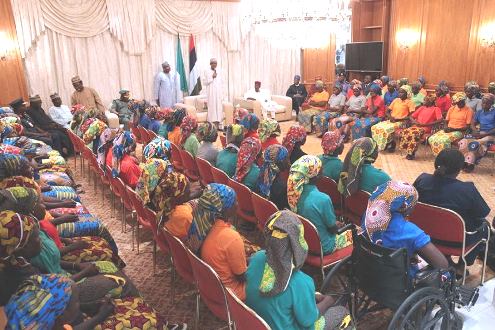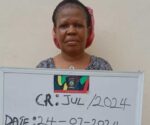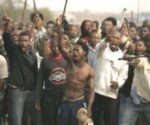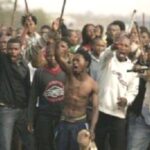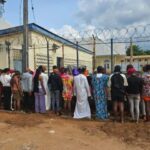Nigeria Govt Pays 2m Euros Ransom For Release Of 82 Chibok Girls-BBC
LAGOS MAY 20TH (URHOBOTODAY)-The release of the 82 girls came with a price.
Five senior Boko Haram militants were moved from a high security unit to be driven to freedom.
The details of the deal are sketchy. Our sources don’t want to be named and their version of events is hard to confirm, but they say the men were high-level Boko Haram bomb-makers, and that they were accompanied by two million euros in cash.
Paying a ransom as well as swapping prisoners was a sticking point that almost unravelled the whole deal, one source tells us.
“It should have happened sooner, but the president was hesitating about freeing the five – and especially about the money,” says the person with detailed knowledge of the deal.
Persuading him was “very, very difficult. It was the most difficult part of the whole negotiation. He didn’t want to pay any money.
“The ransom was two million euros. Boko Haram asked for euros. They chose the suspects and they gave us the list of girls who would be freed.”
Governments rarely admit to paying a ransom, and this claim could not be independently verified.
Reaching that point took a lot of time and there were many setbacks, but trust was gradually built on both sides. The Nigerian army’s surge of military success helped strengthen the government’s hand.
Nigerian senator Sani Shehu has been a main instigator of talks with Boko Haram since the early days of the insurgency.
When Boko Haram’s founder Mohamed Yusuf was murdered in detention, Shehu arranged for his family to meet the former President Olusegun Obasanjo who was trying to broker peace.
He knew a human rights lawyer, Zanna Mustapha, who had grown up with some senior members of Boko Haram in Maiduguri.
Though he never joined the group he had represented them at trial and retained close contact with the leadership.
Zanna Mustapha agreed to join the negotiations, and was to become the key middleman in the release of the first 21 Chibok girls in October 2016, and then the second group of 82.
He was the man on the spot when the girls were handed over.
Neither man has spoken in public about whether any ransom money was paid.
The European Union was approached to act as a mediator, but when it refused, the Swiss government offered to step in.
As the exchange neared, the International Committee of the Red Cross (ICRC), prepared the logistics – helping to transfer the girls to safety – but that was their only involvement.
Like many humanitarian aid organisations operating in conflict areas, the ICRC has contact with both sides to ensure aid gets through. Neither the Swiss nor the ICRC will comment on the detail of the negotiations.
With more than a hundred Chibok girls still being held, the efforts at release are continuing.
There are thought to be at least 13 more Boko Haram commanders in custody who could be exchanged. Now that lines of communication are open the timing will depend on the detail.
Culled from BBC Story titled, “The Fate of Chibok Girls” By Alastair Leithead and Stephanie Hegarty
19 May 2017








